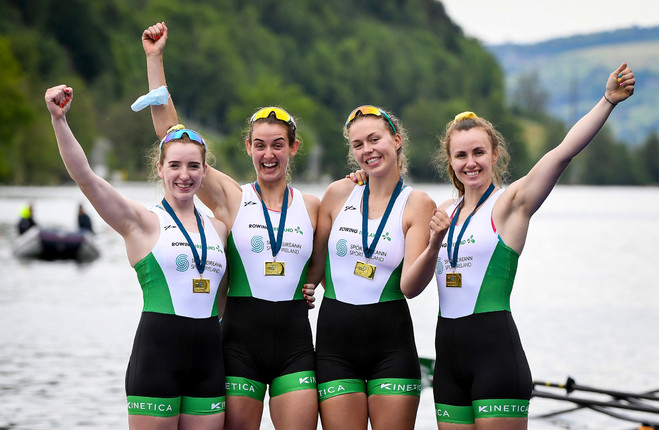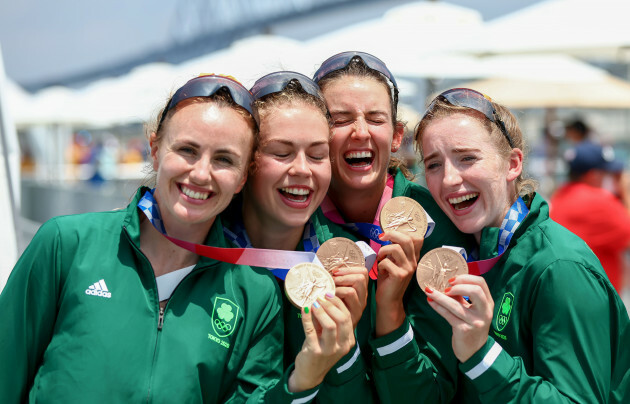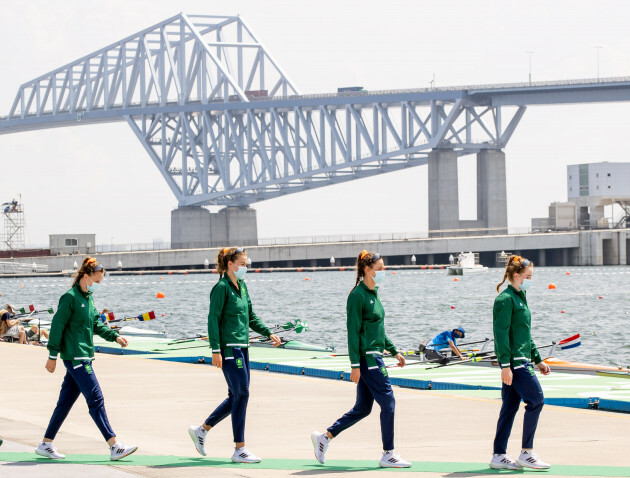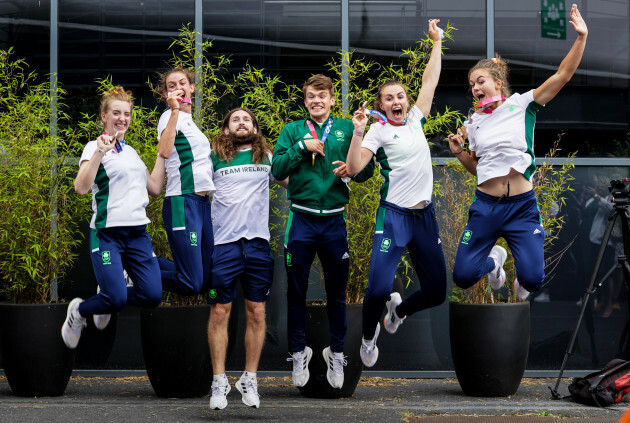IT WASN’T ANYONE in China’s boat or a single rower in the British one. No, the only person standing between Fiona Murtagh and a place on the Olympic podium was Fiona Murtagh.
There was this voice that popped into her head whenever thoughts of Tokyo surfaced. Her technique was sound, her power extraordinary. Physically, as far back as 2017, she was ready. But emotionally? Well, that was a different story.
Prior to Tokyo no one was giving Ireland’s four a chance of medalling. The Canadians, Americans and Germans had done it in Rio; the Australians, Dutch and Danes collecting the garlands at the 2019 World Championships.
At that stage, Fiona Murtagh was still a club rower. She rented a room in a Galway apartment, went to work Monday to Friday, nine to five; trained a few evenings, raced the odd weekend. Life was good. She had a wide social circle in town, her family 10 miles down the road.
Rowing was still part of her present but was drifting towards her past. At 20, after graduating from university in New York, she thought she was done with elite sport. “I’ll move on with my life now,” she told her twin, her confidant, her best friend, Alan.
“Everyone around me was like ‘what are you doing? You are wasting your time here. Just go (into the high performance set-up)’.”
She couldn’t. She wasn’t ready. But a couple of years later, a stunning performance at the national championships caught people’s eye. Another invitation came to join the Ireland squad in January 2020. “That was my now or never moment,” she says. “I said to myself, ‘if I don’t do this, I will look back on the rest of my life with regret’.”
Alan took a call – the way twins tend to when ‘the other one’ needs a listening ear.
“Should I stay or go?” she asked.
“Jeez, Fiona, go, go, go,” he replied.
**
Now it’s August 2021. Fiona Murtagh is on the water in Tokyo in the Olympic final. One thousand metres have passed. Australia’s boat is leading, the Dutch quartet a close second. Gold and silver have gone but bronze? Well, bronze is still there to be won.
“Just go,” she imagines Alan saying.
“It’s such a funny thing being a twin,” says Fiona. “Like, you could be having a bad day and next thing he’ll just phone. ‘You alright?’ he’ll ask. “As kids, like we were inseparable. He was born first; so we always joke he’s the voice of reason. He believed I was good enough (to row at the Olympics) before I did.”
Struggling with confidence is such a common trait in elite athletes. The difference between Murtagh and thousands of other Olympians is that she has the humility to admit it. That’s what turned her into a champion, this recognition of what she was missing, then this determination to fix it.
“I am definitely a changed person,” she says now. “The confidence thing …… ah look, it was prevalent throughout my junior sporting career. I just never had the self-belief. Like, I’d do well in regattas or in tests but whenever I’d watch the Olympics, my instinct was to think, ‘ah that’s something others do’. I just never felt I could do be that athlete.”
Come January 2020, six months before the Games were meant to take place, two months before the world shut down and adjusted to the grim realities of a disease called Covid-19, Fiona Murtagh was finally in an Ireland camp and finally coming to terms with the thing that had held her back.
Her mindset changed. Time after time she kept telling herself she was good enough, an instinct backed up by her results in training. Years earlier, as a junior, she found herself getting upset and overwhelmed by little things. This was different. She was older for a start, 25 when she joined the national set-up, 26 when she medalled in Tokyo.
Better again, whenever she was struggling, she found emotionally mature team-mates waiting to provide solace. “Tomorrow it could be us,” they told her. Things were starting to click. It is one thing hearing praise from your twin, another when it is a world class athlete, with no prior connection, providing that support.
“It was almost like I had an imposter syndrome,” she says. “Like, I was thinking to myself, ‘ah they’re just saying nice things because they’re good people’. But over time, their message began to hit home. On long training sessions, when my mind and body were under the most pressure, I started to actively speak to myself: ‘Fiona, you’re doing a good job here, keep going’.
“It was a lot of work for me to bridge that gap between not having belief and getting it. But I got there over that month (in January 2020). That unattainable goal became doable.”
Still, every now and then, when she’d hit a hard spell in training, the nagging voice would re-appear. “Did I just drop my life, my job in Galway, my friends there, for this?” she’d ask.
She survived. The adjustment from part-time club rower to full-time international was helped by the pandemic and the postponement of the Games. “The difference between me in January 2020 and January 2021 was huge,” she says. Physically fitter, mentally tougher, she was ready for Tokyo.
When they got there, the Irish four didn’t take long to announce themselves, finishing second in their heat, a quarter of a second slower than the eventual gold medal winning Australians, faster than everyone else.
Suddenly it was finals day. Ireland were in lane two, the Australians and Dutch outside them. Before long that pair were out of sight and a race within a race was developing behind them, Ireland vying with Britain and China for bronze. She didn’t realise it at the time as she battled her way down the Sea Forest Waterway but Murtagh was great — pulling harder as the race moved on, reacting to team-mate Eimear Lambe’s call at the 750 metre mark.
“It was a mix of the urgency in her voice and the reality we had to get moving. We all just woke up and started to move a lot quicker. Eimear could see we were moving through China to our right, Great Britain to our left.”
You tend not to overthink things when you are in these situations, your body aching, your mind concentrating on maintaining your technique. This time a different voice came into her head. She remembered a saying she’d first learned at college.
“Your dreams are not in someone else’s hands; their dreams are in yours.”
She thought of Alan, her twin, thought of her own progress from a person who was unsure to one who had become confident.
“Through Covid and everything we became a really tight knit crew. We knew one another well; we trusted each other, came through a lot of ups and downs. It was an emotional rollercoaster of a year and we all knew we had each other’s back. I just wanted to do it for the girls around me. It got us across the line.”
As they did so, collecting bronze, a startling stat appeared on Twitter. Until that moment, only four female athletes had won Olympic medals for Ireland. Now it was eight. She was a new member of this elite grouping.
It still hadn’t really registered what she’d done until she arrived home, a two-hour open-top bus ride taking her around the townlands and villages around her Galway home. “At every house, there was someone outside the door, like every house. They lit bonfires. It was one of the highlights of my life, such a special moment.
“My only hope is that what happened throughout 2021, with Kellie (Harrington), Katie (Taylor), Rachael (Blackmore) has inspired women in sport to realise it is not an impossible task to be a successful Irish female athlete.”
She proved that in Tokyo.




